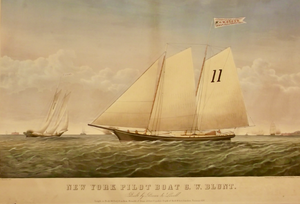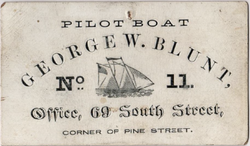Engineering:George W. Blunt (1856)
 George W. Blunt pilot boat (1860). | |
| History | |
|---|---|
| Name: |
|
| Namesake: | George W. Blunt, nautical publisher |
| Owner: |
|
| Operator: |
|
| Builder: | Daniel Westervelt of New York City[1] |
| Launched: | 6 September 1856 |
| Acquired: | by Navy 23 November 1861 |
| Commissioned: | 4 December 1861 |
| Decommissioned: | 16 August 1865 |
| In service: | circa 1856 – 1865 |
| Out of service: | 16 August 1865 |
| Homeport: | New York |
| Nickname(s): | Blunt |
| Fate: | Sold, Port Royal, S.C., 20 October 1865 |
| General characteristics 1st Blunt | |
| Class and type: | Schooner |
| Displacement: | 122 tons |
| Length: | 85 feet |
| Beam: | 21 feet |
| Propulsion: | sails |
| Sail plan: | Schooner-rigged |
| History | |
| Name: | George W. Blunt (2nd pilot schooner) |
| Owner: | New York Pilots |
| Operator: | John Phelan |
| Port of registry: | New York |
| Builder: | Brown & Lovell, Boston, Massachusetts |
| Cost: | $8,000 |
| Completed: | 1861 |
| Acquired: | 1861 |
| Identification: | Official Number 10423 |
| Fate: | wrecked in 1875 |
| General characteristics 2nd George W. Blunt | |
| Class and type: | Schooner |
| Tonnage: | 52 tons |
| Length: | 75.4 feet |
| Beam: | 20.4 feet |
| Depth: | 8.6 feet |
| Propulsion: | sails |
| Sail plan: | Schooner-rigged |
George W. Blunt, completed in 1856, was a schooner built in New York that operated as a New York Sandy Hook pilot boat designated Pilot Boat No. 11.[note 1] The schooner was used to pilot vessels to and from the Port of New York and New Jersey. That schooner was sold to the United States Navy in 1861, renamed and commissioned as the USS G. W. Blunt (1856), serving in the South Atlantic Blockading Squadron in the South. A second schooner, also named George W. Blunt, was built in East Boston in 1861 and purchased to replace the first schooner as a pilot boat.[2][3]
First George W. Blunt pilot boat
Construction and service
The original George W. Blunt was a two-masted, 85-foot long, 122-ton schooner, 20 tons larger than any other boat in the Sandy Hook fleet.[1][4] The cabin was finished with bird's eye maple, mirrors, and velvet brocade cushions. The stern was ornamented with a scroll and shield which displayed the national flags of America, England and France.[1] According to American Lloyd's Register of American and Foreign Shipping, the George W. Blunt was built in New York, in 1856 for the New York Pilots. James Callahan was master of the boat.[5]
As the original pilot-boat, the George W. Blunt, was in service with the N.Y. Pilots and rescued boats off the coast of New York.[6] On October 10, 1860, New York Sandy Hook Pilot A. C. Malcom, of the pilot boat G. W. Blunt, No. 11, signed a statement along with other pilots, that they were satisfied with the representation of the New York Board of Commissioners of Pilots.[7]
Civil War
On November 23, 1861, during the Civil War, the George W. Blunt was purchased by the United States Navy as a gunboat and dispatch boat in support of the Union Navy blockade of Confederate waterways. The schooner was renamed G. W. Blunt and commissioned 4 December 1861.[2][3][8][9]
On April 19, 1862, the 60-ton Confederate schooner Wave under Captain Ryan, was captured by the pilot-boat George W. Blunt off the coast of South Carolina.[10][11]
Second George W. Blunt pilot boat
A replacement pilot boat, built in July 1861, was purchased from Boston builders Brown & Lovell[12] to take the place of the original George W. Blunt, which was sold to the government during the Civil War.[2][3][13][14] The 75-foot vessel (tonnage variously given as 120t and 52t, but types of measure unspecified) was purchased by Henderson & Callahan of New York for $8,000 was described as a fast sailer, and registered at New York to the New York Pilots with Official Number 10423.[2][15]
In 1874, this George W. Blunt, rescued the bark Alfred at sea during a storm that brought the boat safely into New York port.[16][17]
In February 1875, the pilot boat George W. Blunt sprang a leak off Gay Head and was run ashore at Jones Inlet, twenty-eight miles from Sandy Hook and was reported to have become a total loss. She had on board the following pilots: John Handran, Thomas Murphy, Robert Yates, Edward Kelly, James Heines, and Michael O'Shaughnessy. Her value was estimated at $10,000, which only $1,400 was covered by insurance.[18][14]
See also
Footnotes
- ↑ For an illustration of how the number was used see Mary Taylor pilot boat illustration.
References
- ↑ 1.0 1.1 1.2 "New Pilot Boat". New-York Daily Times. 17 December 1856. https://upload.wikimedia.org/wikipedia/commons/d/d8/NYTimes-Dec-17_1856_0536.jpg.
- ↑ 2.0 2.1 2.2 2.3 "Shipping News — Miscellaneous". The New York Herald: 8. December 2, 1861. https://chroniclingamerica.loc.gov/lccn/sn83030313/1861-12-02/ed-1/seq-8/. Retrieved 1 September 2020.
- ↑ 3.0 3.1 3.2 Naval History And Heritage Command (July 9, 2015). "G. W. Blunt". Dictionary of American Naval Fighting Ships. Naval History And Heritage Command. https://www.history.navy.mil/research/histories/ship-histories/danfs/g/g-w-blunt.html. "G. W. Blunt, formerly Blunt, was a wooden two-masted schooner acquired by the Navy in New York 23 November 1861."
- ↑ "Marine Items." (in en). http://timesmachine.nytimes.com/timesmachine/1856/12/17/77067372.html?pageNumber=8.
- ↑ "American Lloyd's Register of American and Foreign Shipping". 1859. https://research.mysticseaport.org/item/l0237571859/353/.
- ↑ "Maritime Intelligence, Arrived". New York Herald: p. 8. 1859-12-08. https://chroniclingamerica.loc.gov/lccn/sn83030313/1859-12-08/ed-1/seq-8/#date1=1856&index=3&date2=1861&searchType=advanced&language=&sequence=0&words=11+Blunt&proxdistance=5&state=&rows=20&ortext=&proxtext=&phrasetext=%22Blunt+No+11%22&andtext=&dateFilterType=yearRange&page=1. "Brig Jacob Dock...was taken in tow by pilot boat Geo W Blunt, No 11... and towed to the city."
- ↑ "The New York Pilots. To The Editor Of The Herald.". New York Daily Herald (New York, New York): p. 2. 10 Oct 1860. https://www.newspapers.com/clip/68765917/board-of-commissioners/.
- ↑ "Miscellaneous Items". New England Farmer (Boston, Massachusetts). 1861-11-30. https://www.newspapers.com/image/404613877/?terms=%22George%2BW.%2BBlunt%22%2Bpilot%2Bboat.
- ↑ "American Lloyd's Register of American and Foreign Shipping, 1869". 1869. https://research.mysticseaport.org/item/l0237571869/638/.
- ↑ "April-Fifty Years Ago". The Weekly Independent (Coffeyville, Kansas). 1912-05-09. https://www.newspapers.com/image/489309119/?terms=%22Pilot%2Bboat%2BBlunt%22.
- ↑ Cunliffe, Tom, Pilots: Pilot, The World Of Pilotage Under Sail and Oar Wooden Boat Publications. Brooklin, Maine. 2001
- ↑ "The American Yacht List: Containing a Complete Register of the Yacht Clubs, List of Pilot Boats, Port of New York". 1874. https://books.google.com/books?id=MORB6l-IM1EC&dq=Brown+%26+Lovell+sold+yachts+from+Boston&pg=RA11-PA8.
- ↑ "Record of American and Foreign Shipping, 1877". https://research.mysticseaport.org/item/l0179721877/436/.
- ↑ 14.0 14.1 "Total Wreck Of A Pilot Boat". New York Daily Herald (New York, New York). 1875-02-04. https://www.newspapers.com/image/329399640/?terms=%22Pilot%2Bboat%2BG.%2BW.%2BBlunt%22.
- ↑ Record of American and Foreign Shipping. New York: American Shipmasters' Association. 1876. p. 360. https://research.mysticseaport.org/item/l0179721876/415/. Retrieved 3 September 2020.
- ↑ Charles Edward Russell, From Sandy Hook to 62, The Century Co., New York, 1929, page 150. OCLC 640130103
- ↑ "The New York Pilots". New York Daily Herald (New York, New York). 1874-05-11. https://www.newspapers.com/image/329572187/?terms=%22Pilot%2BBoat%2BGeorge%2BW.%2BBlunt%22.
- ↑ "Loss Of A Pilot-Boat". The New York Times (New York, New York). 1875-02-04. https://www.newspapers.com/image/20599937/?terms=%22George%2BW.%2BBlunt%2BNo%2B11%22.
External links
 |


